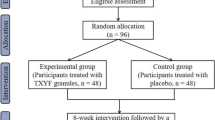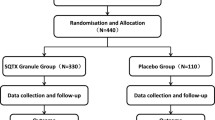Abstract
Objective
To evaluate the efficacy and safety of Chinese medicine (CM) decoction Chang’an I Recipe (肠安 I 号方) in the treatment of irritable bowel syndrome with diarrhea (IBS-D).
Method
A multicenter, randomized, double-blind, placebo-controlled clinical trial was designed. Based on the order of inclusion, the IBS-D patients were randomly assigned to the treatment group or the placebo control group, administrated with Chang’an I Recipe or placebo, 150 mL/bag, 3 times daily, for 8 weeks. The primary indices of efficacy included the effective rates of IBS symptom severity score (IBS-SSS) and the differences in adequate relief (AR) responder; the secondary indexes of efficacy included the changes in scores of the IBS Quality of Life (IBS-QOL) and Hospital Anxiety and Depression (HAD) scales. The safety indices included adverse events and related laboratory tests.
Results
A total of 216 patients were included, with 109 in the treatment group and 107 in the control group, and finally 206 were included in the full analysis set (FAS), 191 were included in the per protocol set (PPS). In FAS, the total effective rate was 67.6% and 40.2% for the treatment and control groups, respectively, with 95% confidence interval (CI) for difference in the effective rates between the two groups of 14.4%–40.2%; while in PPS, the total effective rate was 71.3% and 41.2% for the treatment and control groups, respectively (95% CI 16.6%–43.4%). The consistent conclusions of FAS and PPS showed a better efficacy in the treatment group. Both FAS and PPS showed higher AR responder in the treatment group (FAS: 59.6% vs. 35.5%; PPS: 62.8% vs. 38.1%). As for IBS-QOL, the total score and scores in various dimensions of IBS-QOL were not significantly different between the two groups (P>0.05). Both anxiety and depression scales of HAD were not significantly different between the two groups (P>0.05). No adverse events or laboratory abnormalities were found to be obviously related to the tested drugs or clinically significant.
Conclusion
Chang’an I Recipe was more effective than placebo in the treatment of IBS-D, with no obvious adverse reactions. (No.ChiCTR-TRC-09000328)
Similar content being viewed by others
References
Pan GZ, Lu SC, Ke MY, Han SM, Guo HP, Fang XC. An epidemiologic study of irritable bowel syndrome in Beijing— a stratified randomized study by clustering sampling. Chin J Epidemiol (Chin) 2000;21:26–29.
Xiong LS, Chen MH, Chen HX, Xu AG, Wang WA, Hu PJ. A population–based epidemiologic study of irritable bowel syndrome in Guangdong Province. Natl Med J China (Chin) 2004;84:278–281.
Hulisz D. The burden of illness of irritable bowel syndrome: current challenges and hope for the future. J Manag Care Pharm 2004;10:299–309.
Otero RW, Gomez ZM. Irritable bowel syndrome: a concise diagnostic and pharmacological therapy review. Rev Gastroenterol Peru 2005;25:189–197.
Shanghai Bificocorporation group. Effect of bifico on diarrhea–predominant irritable bowel syndrome: a multicenter clinical trial. Shanghai Med J (Chin) 2004;27:728–731.
Ma YX, Liu X, Liu CZ, Wang LP, Guo G, Du DQ, et al. Randomized clinical trial: the clinical effects of herbpartitioned moxibustion in patients with diarrhoeapredominant irritable bowel syndrome. Evid Based Complement Alternat Med 2013;2013:605460.
Rafiei R, Ataie M, Ramezani MA, Etemadi A, Ataei B, Nikyar H, et al. A new acupuncture method for management of irritable bowel syndrome: a randomized double blind clinical trial. J Res Med Sci 2014;19:913–917.
Chen MX, Chen JX, Xia L, Fu R, Lu Z. Treating irritable bowel syndrome with diarrhea patients by Yigan Fupi Decoction: a randomized controlled trial. Chin J Integr Tradit West Med (Chin) 2014;34:656–660.
Pan F, Zhang T, Zhang YH, Xu JJ, Chen FM. Effect of Tongxie Yaofang Granule in treating diarrhea–predominate irritable bowel syndrome. Chin J Integr Med 2009;15:216–219.
Zhang RM, Wang L, Yang XN, Xia Q, Jiang MD, Fan ZJ, et al. Dinggui Oil Capsule in treating irritable bowel syndrome with stagnation of qi and cold: a prospective, multi–center, randomized, placebo–controlled, double–blind trial. J Chin Integr Med (Chin) 2007;5:392–397.
Leung WK, Wu JC, Liang SM, Chan LS, Chan FK, Xie H, et al. Treatment of diarrhea–predominant irritable bowel syndrome with traditional Chinese herbal medicine: a randomized placebocontrolled trial. Am J Gastroenterol 2006;101:1574–1580.
Bensoussan A, Talley NJ, Hing M, Menzies R, Guo A, Ngu M. Treatment of irritable bowel syndrome with Chinese herbal medicine: a randomized controlled trial. JAMA 1998;280:1585–1589.
Zhang SS, Wang HB, Li ZH, Tang XD, Wang XY, Liu JP, et al. A multi–center randomized controlled trial on treatment of diarrhea–predominant irritable bowel syndrome by Chinese medicine syndrome–differentiation therapy. Chin J Integr Tradit West Med (Chin) 2010;30:9–12.
Longstreth GF, Thompson WG, Chey WD, Houghton LA, Mearin F, Spiller RC. Functional bowel disorders. Gastroenterology 2006;130:1480–1491.
Francis CY, Morris J, Whorwell PJ. The irritable bowel severity scoring system: a simple method of monitoring irritable bowel syndrome and its progress. Aliment Pharmacol Ther 1997;11:395–402.
Camilleri M, Mayer EA, Drossmana A. Improvement in pain and bowel function in female irritable bowel patients with alosetron, a 5–HT3 receptor antagonist. Aliment Pharmacol Ther 1999;13:1149–1159.
Huang WW, Zhou FS, Bushnell DM, Diakite C, Yang XH. Cultural adaptation and application of the IBS–QOL in China: a disease–specific quality–of–life questionnaire. Qual Life Res 2007;16:991–996.
Zigmond AS, Snaith RP. HAD: the hospital anxiety and depression scale. Acta Psychiatr Scand 1983;67:361–370.
Bian LQ, Chen T, Tang XD, Li ZH, Li BS, Zhang YQ, et al. Analysis of treatment methods on irritable bowel syndrome by TCM therapy. Glob Tradit Chin Med (Chin) 2015;8:119–123.
Liu JP, Yang M, Liu YX, Wei M, Grimsgaard S. Herbal medicines for treatment of irritable bowel syndrome. Cochrane Database Sys Rev 2006;1:CD004116.
Lin M, Tang XD, Wang FY. Influence of NF–κB of rat colon by Chang’an for experimental D–IBS. China J Tradit Chin Med Phar (Chin) 2010;25:2339–2341.
Lin M, Tang XD, Wang FY. Pharmacodynamics study on Chang’an and control placebo containing low concentration original drug. Shenzhen J Integr Tradit Chin West Med (Chin) 2009;19:273–278.
Lin M, Tang XD. Influence on the immune function of diarrhea–predominant irritable bowel syndrome in rats treated with Chang’an. Shenzhen J Integr Tradit Chin West Med (Chin) 2009;19:333–335.
Yang J, Wang W. Shugan Jianpi Decoction in treating diarrhea type irritable bowel syndrome of multicenter randomized parallel control. J Pract Tradit Chin Intern Med (Chin) 2015;29:26–28.
Tang XD, Bian LQ, Gao R, Guan SJ. Exploration into the preparation of placebos used in Chinese medicinal clinical trial. Chin J Integr Tradit West Med (Chin) 2009;29:656–658.
Author information
Authors and Affiliations
Corresponding author
Additional information
Supported by China International Sciences and Technology Cooperation Program (No. 2007DFA30560)
Rights and permissions
About this article
Cite this article
Tang, Xd., Lu, B., Li, Zh. et al. Therapeutic Effect of Chang’an I Recipe (肠安 I 号方) on Irritable Bowel Syndrome with Diarrhea: A Multicenter Randomized Double-Blind Placebo-Controlled Clinical Trial. Chin. J. Integr. Med. 24, 645–652 (2018). https://doi.org/10.1007/s11655-016-2596-9
Accepted:
Published:
Issue Date:
DOI: https://doi.org/10.1007/s11655-016-2596-9




